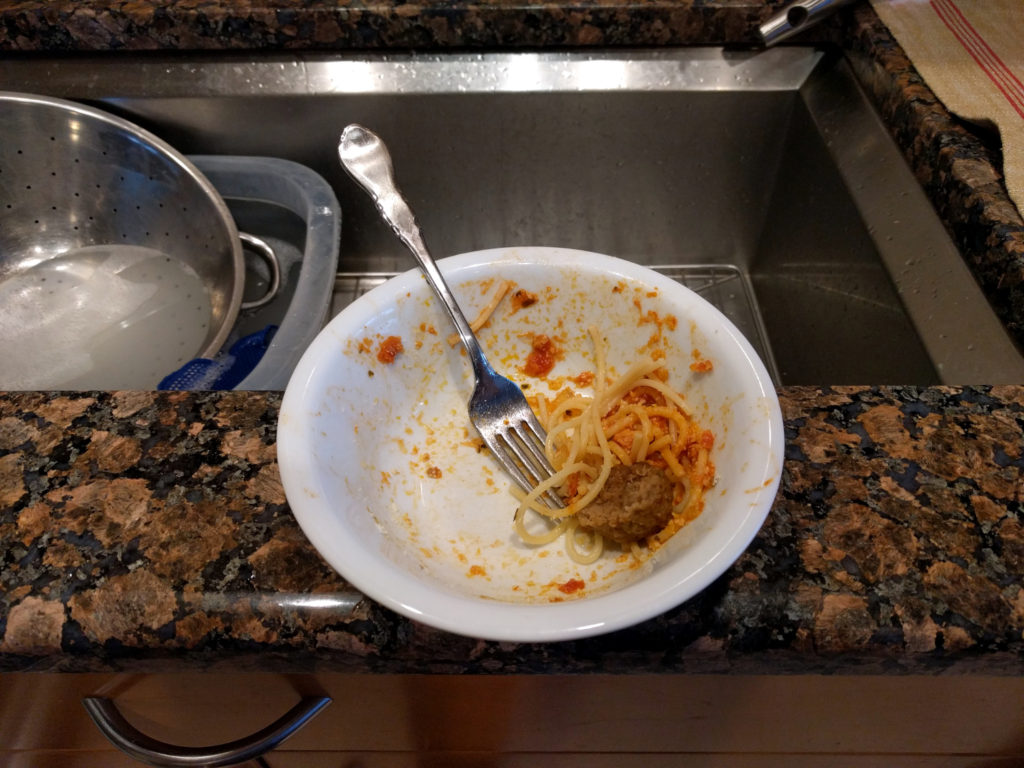There are two crucial parts to becoming a person in control of your weight. (1) Monitor your weight and (2) regulate your food intake. Both are important and you can’t be in control without both parts. Remember, my goal is not to lose 120 pounds. My goal is not to reach some target weight number. I have no idea what I will eventually weigh! My goal is to become a person who is in control of their body’s weight. To do this, I had to change my old thinking and demote my old values. For example: tonight was spaghetti with meatball night; the kids always leave some behind. Before I changed myself into someone in control of his weight, I would have eaten those leftovers as I cleared the dishes, because I didn’t like to waste food. That was a value.

My daily food intake and calorie count are:
Breakfast – 2 x chicken and hummus wraps (150); 33 grams chocolate (175)
- 475 calories
Lunch – 5 x pyrohi (75) plus butter
- 500 calories
Dinner – 6 oz cooked spaghetti (300); 5 Costco meatballs (230).
- 530 calories
Snacking – tea with half and half (80); pretzels and cheese (120); chocolate caramel (55); grapes (50)
- 305 calories
Total for the day: 1810 calories (limit 1800)
Tonight, I threw all the leftovers away. I threw away more than what you see here. My new value is that I am in control of what I eat. I have already eaten enough today, so the kids’ leftover food gets thrown away. (Noodles and meatballs no one has touched get stored for another day. I still have my values, they’re just less important to me than my new values.) I value being in control of my weight most. Therefore, I must monitor my weight and regulate my food intake.
I read a sad article today about Salvador, who spent years trying and failing to lose weight. Ultimately there was a happy resolution for Salvador. He himself seems admirably full of willpower. He dieted (he says) for three years, using a strategy based on willpower and “diet foods”, and lost no weight. What perseverance! I would have given up before three weeks.
The sad part of the article is Peter (the writer)’s tone of defeat, anger, and excuses. Most of the article is an attack on the concept of counting calories. But the article has some useful information in spite of itself. Salvador wasted a lot of time forcing himself to eat things he didn’t want in an attempt to lose weight. The article says during the three years where he made no progress, Salvador forced himself to eat mostly diet food low in fat, while counting calories. (The Doctor sees hints that Salvador also drank a lot of calories in Gatorade and fruit juice. Calorie rich drinks are an easy way to load up on calories without thinking about it.) He says he exercised 5 times per week. He lost no weight, apparently. The Doctor has his suspicions about this. The Doctor has been there.
Anyway, the Doctor totally agrees that this was the wrong approach. Three years of forcing yourself to eat things you don’t want and not getting anything in return? That is not working with your heart, mind, and body together. Forcing yourself to exercise to lose weight? All testaments to his will. But not useful for the purpose.
Eventually, Salvador started eating regular food again, food that he enjoyed. According to Peter, the author, this resulted in weight loss and total health. Reading the article, you’d think that Salvador just eats what he wants now, and everything is perfect for him without any effort. Ha, ha! The Doctor knows better. Salvador is still counting calories, or else he would be gaining weight again. He is using part of the Doctor’s approach: eat smaller amounts of foods you like. Use foods you like as a reward and as a reason to hold off filling your belly. Avoid eating things you don’t like. If some foods leave you hungry, substitute foods that leave you feeling satisfied until the next meal. The Doctor approves! Good on Salvador for finding an approach that works.
-The Doctor